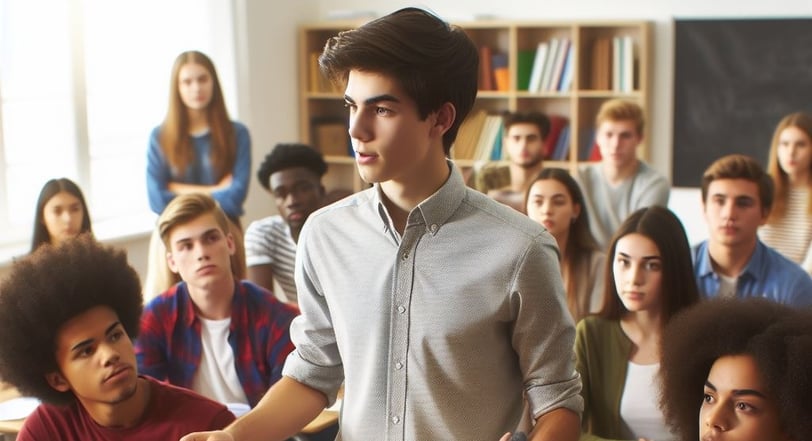Help keep this website stay online by supporting us in ways you can!
Harnessing the Power of Debate to Reduce School Violence
BLOG
5/8/20243 min read


Introduction
In our ongoing efforts to create safer and more inclusive school environments, integrating structured debate into curricula emerges as a powerful tool. Research consistently demonstrates that debate programs foster critical thinking, constructive communication, and empathy – all vital components in reducing the potential for school violence. In this article, we delve into how debate can transform school climates and contribute to a more harmonious educational experience.
The Role of Open Dialogue in Conflict Resolution


Debate cultivates respectful and productive exchange. By participating in debates, students learn to:
Express Their Perspectives: Debaters articulate their viewpoints effectively, honing their communication skills.
Listen Actively to Opposing Views: Engaging with differing opinions encourages empathy and understanding.
Consider Alternative Solutions: Debaters explore multiple approaches, promoting open-mindedness.
This emphasis on open dialogue can prevent misunderstandings from escalating into violence, ultimately fostering a culture of understanding within schools.
Developing Empathy and Tolerance
Debate provides a unique opportunity for students to step outside their own perspectives and engage with diverse viewpoints. Through this process, they develop empathy – the ability to understand and share the feelings of others. When faced with disagreements, empathetic students are less likely to resort to violence. Debate programs offer a safe, structured environment to practice these essential skills, minimizing feelings of alienation that can contribute to negative behaviors.
Critical Thinking as a Violence Prevention Tool




Debate demands rigorous analysis and evidence-based reasoning. Students learn to:
Identify Fallacies: Debaters recognize flawed arguments and faulty reasoning.
Evaluate Sources: They assess the credibility of information, promoting media literacy.
Construct Sound Arguments: Debaters build well-reasoned cases based on evidence.
The study "Debate Education: A Review of Research on Its Cognitive, Emotional, and Social Effects (2003) by John Meany et al." is a comprehensive review of existing research on the effects of debate education. The study suggests that debate education has a positive impact on critical thinking, self-esteem, and communication skills. These skills are essential for effective communication and conflict resolution, which can indirectly contribute to a reduction in violence. By engaging in debates, students learn to argue their points respectfully and to consider different perspectives, which can foster empathy and understanding, thereby reducing the likelihood of violent behavior.
The study highlights the importance of debate education in improving cognitive, emotional, and social skills, which are crucial for personal and professional success. By providing students with the tools to engage in constructive dialogue, debate education can help to create a more peaceful and understanding society.
Addressing Counterarguments
While concerns about debate encouraging aggressive behavior or being a time-waster are valid, well-structured debate programs prioritize:
Respect: Debaters learn to engage with courtesy and consideration.
Collaboration: Teamwork and cooperation are integral to successful debates.
Analytical Skill-Building: Debaters sharpen their ability to dissect complex issues.
These elements directly counteract aggression, making debate a valuable use of educational time.
The Impact on School Climate


Debate programs contribute significantly to creating a positive school climate. By modeling civil discourse and valuing diverse perspectives, they achieve the following:
Student Belonging: When students feel heard and respected, they experience a sense of belonging. This sense of community reduces instances of violence.
Conflict Resolution Norms: Debates establish norms for resolving disagreements constructively, influencing overall behavior.
Call to Action
To harness the power of debate for reducing school violence, consider the following steps:
Educators: Integrate debate activities into classrooms or launch extracurricular debate teams. Resources for implementation are available through organizations like the
[The Center for Debate and Civic Education (CDCE), The National Association for Urban Debate Leagues (NAUDL), The National Speech & Debate Association (NSDA), The Adaptive Challenges of Curriculum Implementation. National Speech and Debate Association].
Policymakers: Advocate for the inclusion of debate programs in district-wide initiatives focusing on school safety and student well-being.
Community Members: Support existing debate programs through volunteering, mentorship, or donations.
Conclusion
Investing in debate programs equips students with the communication and critical thinking skills necessary to navigate disagreements constructively. By doing so, we create safer schools and lay the foundation for a more understanding and peaceful society.



